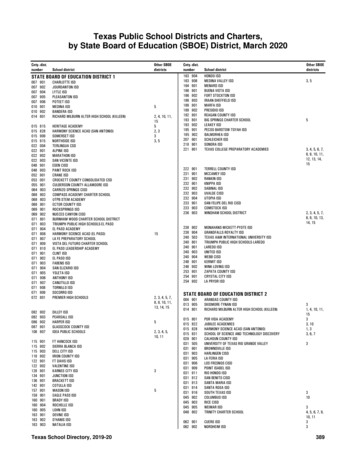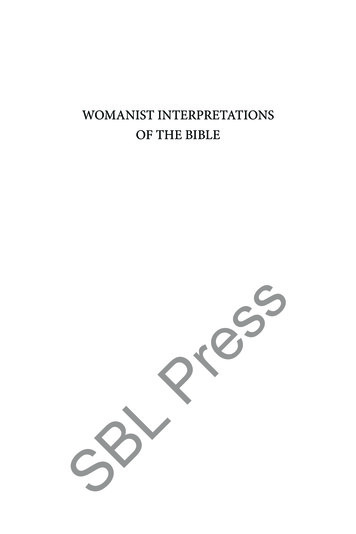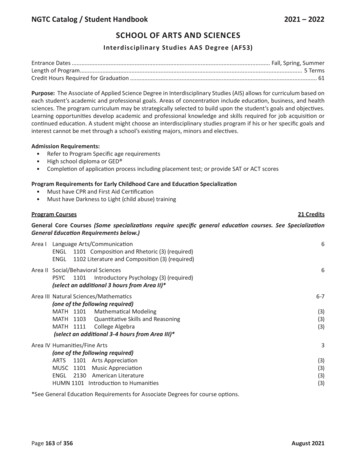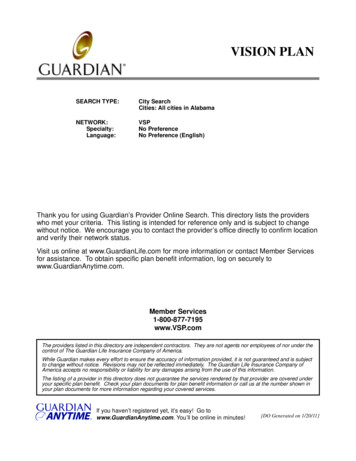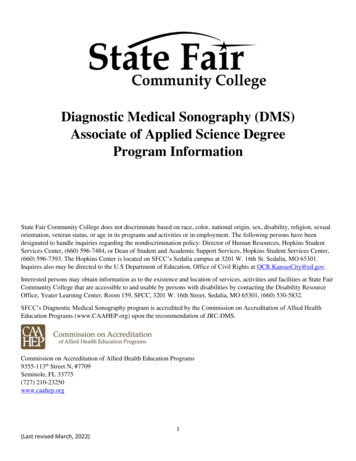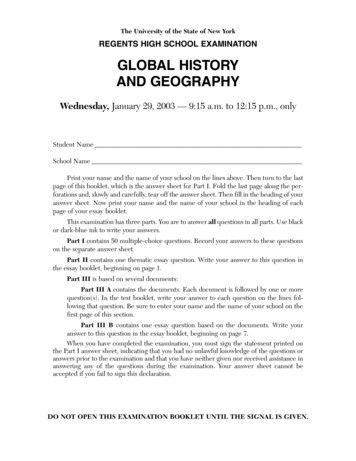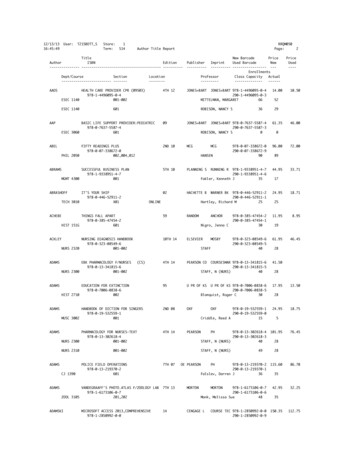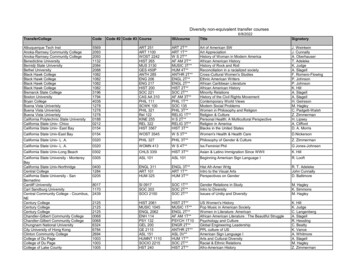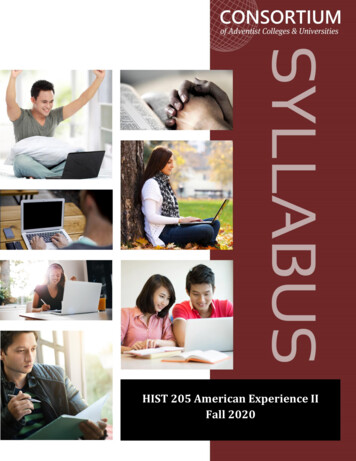
Transcription
HIST 205 American Experience IIFall 2020
HIST 205 American Experience IIConsortium of Adventist Colleges and UniversitiesInteractive Online FormatThis course follows an interactive online format and has Thursday deadlines. You are expectedto login regularly during the course to participate in the online discussions. Please planaccordingly. Please review the Dates & Deadlines widget on the right side of yourcourse in LearningHub for the last day to withdraw for a full refund.Instructor ContactPlease refer to course in LearningHub for the teacher contact information.Other AssistanceUsername and password assistanceEnrollment and withdrawal questionsTechnical assistance with online coursesExam requests and online proctoringDistance Student Services - any other andrews.edu(269) 471-6016(269) 471-6323(269) 471-3960(269) 471-6566(269) 471-6566Part 1: Course InformationCourse DescriptionsA study of the development of the United States from Reconstruction to the present. Emphasisplaced on cultural, religious, ethnic, and other social issues as well as politics, economics, andforeign relations.Required Text/MaterialNorton, M.B., Kamensky, J., Sheriff, C., Blight, D.W., Chudacoff, H.P., Vogevall, F., and Bailey,B. (2015) A People and a Nation, Volume II: Since 1865, 10th edition. Stanford, CT:Cengage. ISBN# 978-1285425894.Brown, V.B. and Shannon, T.J. (2016) Going to the Source, Volume II: Since 1865: The BedfordReader in American History. 4th edition. Boston, MA: Bedford St. Martin’s. ISBN# 9781319027506.Other readings as assigned.NOTE: Textbooks for online courses may be purchased from any supplier. For financial aid inpayment, contact your financial advisor at the university where you are completing your degree.Andrews University degree students who have confirmed that funds are available will thenpurchase the books themselves and send receipts to their financial advisor for reimbursement.Last Updated: 7/31/2020Page 2
HIST 205SyllabusCredit Hour and CommitmentThis course is offered for 3 semester credits; therefore, it is expected that you will spend 135[total hours on this course. This translates to a steady 9 hours each week. You’ll spend your timereading, writing papers, accessing instructional materials, interacting with your instructor andclassmates, and completing quizzes.A recommended weekly schedule to divide your time is provided:Readings: 3 hoursLectures: 3 hoursInteractive Discussions: 1 hourQuizzes: 1 hourExams: 2 hoursWriting assignments: 1 hourInstitutional Outcomes:1.a. Demonstrate competence in intellectual, affective, and practical skills to prepare forcareers in the twenty-first century, lifelong learning and service.1.b. Select and apply intellectual, affective, and practical skills from their field of study tosolve meaningful problems. The identified transferable skills for undergraduate studentsare: information literacy, quantitative literacy, engaging diverse perspectives, ethicalreasoning, analytical inquiry in the form of problem solving and creative thinking,communication, wellness and transferable life skills.2.b. Pursue enduring questions through study in core fields and explore the connectionsbetween those fields.Student Learning OutcomesAfter completing this course, students should be able to:1. Demonstrate survey knowledge of principle events, people, religious movements, andhistorical themes in American history from Reconstruction to present.2. Engage in thoughtful analysis of historical questions through the use of primarydocuments.3. Apply knowledge of the past to better understand the present.4. Consider connections, similarities, and differences between people across time andspace.5. Think more critically about their lives and the experiences of those around them.6. Present their original ideas through the use of technology and textLast Updated: 7/31/2020Page 3
HIST 205SyllabusPart 2: Course Methods and DeliveryMethods of InstructionMethods of instruction include assigned readings from the textbook and the course material,PowerPoint presentations, short essays and reflections on the reading, quizzes on the readings,primary source analysis, interactions with the instructor via discussion blogs, and three exams.Regular participation in the course is essential to good performance.Technical Requirements Internet connection (DSL, LAN, or cable connection desirable).LearningHub AccessThis course is delivered online through LearningHub at http://learninghub.andrews.eduYour username and password are your Andrews username and password. You need to activateyour username and password to access LearningHub. Please do this online ion/information.jsp if you haven’t already. If youneed assistance, call or email us: (296) 471-6016 or mailto:helpdesk@andrews.edu.If you need technical assistance at any time during the course, or to report a problem withLearningHub, please email dlit@andrews.edu or call (269) 471-3960.Part 3: Course RequirementsImportant Note: This online class is not self-paced. You can arrange your schedule flexiblyduring each week, but you MUST participate each week. You are expected to “show up” to classby interacting in the discussion forums a minimum of two times per week. In addition,assignments are due regularly each week. Adequate Internet access during the duration of thecourse is critical for your participation. To be successful, plan to spend time daily on the course.Assessment DescriptionsQuizzes (10% of course grade):Quizzes will be given after each numbered section of the course (roughly at the end of eachweek). Quizzes will count for 10 percent toward your final grade.Writing Assignments (15% of course grade):Each student will write three short document-based papers. The purpose of each writingassignment is to give students an opportunity to work with historical documents and to analyzehistory. Students should analyze their documents to answer several questions - of foremostinterest: what do the documents tell us about the United States at that time?Each paper should be typed, double-spaced, and spell-checked. In addition, papers should beclear, coherent, and precise as possible. Generally, that does not mean that the rough/first draftis also the final draft of the paper. Bibliographic and citation references should follow standardhistorical practice. Several examples are placed on the class site; for a complete manual, see thelatest editions of The Chicago Manual of Style or K. Turabian, A Manual for Writers of TermPapers, Theses, and Dissertations.Last Updated: 7/31/2020Page 4
HIST 205SyllabusExams (40% of course grade):Two exams will be required (Exam #1 after modules 1-5; Exam #2 after modules 6-10). Each willcount for 20 percent of your total course grade. Exams will include, but are not limited to, acombination of multiple choice, identifications, short answer, and essay questions.Discussion Forums (15% of course grade):Discussion forums are opportunities for you, the course instructor and your classmates toengage in robust online conversations. In some instances, where one student is enrolled in acourse, discussions will be with the instructor. Those conversations are most often based onacademic topics and questions. They are integral to the course and provide avenues forenriching knowledge as well as constructing knowledge through thoughtful dialogue with peersand instructors.Discussion blogs will be posted at random intervals and students will compose thoughtful, clear,and concise answers to questions based on primary-source readings from Going to the Source.To complete each discussion post with the documents from Going to the Source, it is helpful touse the Source Analysis Table from each chapter. This allows students to examine and unpackeach document and record significance and common themes.Whenever appropriate, any idea or statement in a discussion forum that is not your own originalwork should be referenced, according to the style guide adopted by your academic discipline(e.g. APA, MLA, Chicago, etc.).Some discussions are formal in nature and call for thorough scholarship. They hold to the sameacademic standards for originality and honesty as other academic work (e.g. papers, essays,quizzes and exams). Whenever appropriate, any idea or statement in a discussion forum that isnot your own original work should be referenced, according to the style guide adopted by youracademic discipline (e.g. APA, MLA, Chicago, etc.).There may also be forums in the course in which the discussions are informal. Such discussionsmay include personal introductions and opportunities to know more about other participants inthe course as well as academic topics. Informal forums are great for sharing interests,observations and encouragements with classmates.For each forum in this course you will be required, unless otherwise instructed, to create aninitial post and, at least, two replies to classmates. Course weeks [after the first week] begin onFriday and end on Thursday. The initial post is due by 11:55 pm on Sunday of the week thediscussion is assigned. Replies to classmates are due by 11:55 pm on Thursday of the week thediscussion is assigned. Discussion blogs will count for 15 percent of your total grade.Last Updated: 7/31/2020Page 5
HIST 205SyllabusRubricsWriting Assignment Grading RubricCriteriaExceptional90-100%Very alitySuperb analysis of primarysources with significanceto US history; well-written;proper citationsAttempt at analysisof primary sources;proper citations,thesis not as clearSummary ofdocuments, noanalysis; propercitationsDoes not meet pageand/or documentrequirement; noanalysis; citationsNo Submission orAcademicDishonesty0%No citations;plagiarism; nosubmissionDiscussion Forum Grading RubricCriteriaExceptional90-100%Very correctSubmission60%QualityAnsweredquestion askedwith introduction,clearly statedthesis,correspondingexamples anddetail, andconclusion thatincludessignificance in USHistoryAnswers questionasked with anattempted thesisstatement, someexamples anddetail, andconclusion thattries to includesignificance in USHistoryAnswers questionasked with asummarized,briefly statedanswer; littleattention to detail,and no analysis ofsignificance in USHistoryRestates questionasked, but doesnot include anyadditional detailor examplesStudent choosesnot to answerquestion correctlyNo Submissionor AcademicDishonesty0%Student copiesanswers frominternet and/ortextbook Or doesnot submit blogExamsThere are three exams in this course. Exam 1 covers material from Chapters 14-17 & 19 and ismade up of multiple-choice and one essay question and is worth 100 points. You will be allowed2.5 hours to take this exam. This exam is worth 20% of your grade. Exam 2 covers material fromChapters 18 & 20-23 and is made up of multiple-choice and one essay question and is worth 100points. You will be allowed 2.5 hours to take this exam. This exam is worth 20% of your grade.The final exam covers material from Chapters 24-28, is made up of multiple-choice, essay andone comprehensive analytical question, and is worth 100 points. You will be allowed 2.5 hoursto take this exam. This exam is worth 20% of your grade. All exams require proctoring.Follow prompts in the course space to set up your exam session. In each module that containsan exam, you will find what to review and what materials are allowed (if any) during the exam.Please read the important information about taking exams and how online proctoring works atwww.andrews.edu/distance/students/exams.html. The follow the instructions that apply toyour situation on the exam request form to set up your exam session.Please note that an exam code is never released to the student. All students must present photoidentification before each exam session. Exams can only be proctored after a deadline withapproval directly from the instructor to the Testing Center (sdeexams@andrews.edu or 269-4716566). No exam is returned to the student for review. The instructor, to aid studying for futureexams can provide feedback on exams.Last Updated: 7/31/2020Page 6
HIST 205SyllabusSchedule:All times in the schedule are for the U.S. Eastern Time Zone. All assignments are due Thursdays in theweek assigned unless otherwise etThese items will need to be completedbefore you will have access to the rest ofthe courseOrientationStudent IntroductionsCourse OverviewAcademic Integrity QuizIntroductionsAcademic Integrity StatementAcademic Integrity1Aug 24-27Reconstruction & the New SouthNorton: Chapter 14Quiz #1Brown & Shannon: Chapter 1Discussion Post #1PowerPoint Presentation2Aug 28 – Sept 3The Ecology & New Frontier of theWestDue Thurs, Sept 3, 11:55pmNorton: Chapter 15Quiz #2Brown & Shannon: Chapter 2Discussion Post #2SLO1, SLO2,SLO3, SLO4,SLO5, &SLO6PowerPoint Presentation3Sept 4-104Sept 11-17The Machine Age: Building Factories,Building Cities, 1877-1900Gilded Age Politics, Imperialism &Agrarian ReformNorton: Chapter 16Quiz #3Brown & Shannon: Chapters 3 & 4Discussion Post #3PowerPoint PresentationPaper Assignment #1Norton: Chapters 17 & 19Quiz #4Brown & Shannon: Chapters 3 & 4Discussion Post #46Sept 24 – Oct 1SLO1 & SLO4Exam # 1 (modules 1 -4)The Progressive EraNorton: Chapter 18Quiz #5Brown & Shannon: Chapter 5Discussion Post #5SLO1, SLO3,SLO4, SLO5,& SLO6PowerPoint Presentation7Oct 2-8The Great WarNorton: Chapter 20Quiz #6Brown & Shannon: Chapter 7Paper #2SLO1, SLO3,SLO4, SLO5,& SLO6PowerPoint Presentation8Oct 9-15The New Era: The 1920’sNorton: Chapter 21Quiz #7Brown & Shannon: Chapter 6Discussion Post #6SLO1, SLO2,SLO3, SLO4,SLO5, &SLO6PowerPoint Presentation9Oct 16-22The Great Depression and the New DealNorton: Chapter 22Quiz #8Brown & Shannon: Chapter 8Discussion Post #7SLO1, SLO3,SLO4, SLO5,& SLO6PowerPoint Presentation10Oct 23-29World War II at Home and Abroad11Oct 30 – Nov 5Norton: Chapter 23Quiz #9Brown & Shannon: Chapter 9PowerPoint PresentationDiscussion Post #8SLO1, SLO3,SLO4, SLO5,& SLO6SLO1 & SLO4Exam #2 (Modules 5-9)12Nov 6-12Post-War, Cold War, and America atMid CenturyNorton: Chapters 24 & 25Quiz #10PowerPoint PresentationDiscussion Post #913Nov 13-19The 1960s, 1960-1968Norton: Chapters 26Quiz #11Brown & Shannon: Chapters 10 & 11Discussion Post #10SLO1, SLO2,SLO3, SLO4,SLO5, &SLO6PowerPoint PresentationLast Updated: 7/31/2020SLO1, SLO3,SLO4, SLO5,& SLO6SLO1, SLO3,SLO4, SLO5,& SLO6PowerPoint Presentation5Sept 18-24SLO1, SLO3,SLO4, SLO5,& SLO6Page 7SLO1, SLO3,SLO4, SLO5,& SLO6
HIST et14Nov 20-26(Thanksgiving)A Pivotal Era, 1969-1980Norton: Chapters 27Quiz #12Brown & Shannon: Chapter 12Paper #3PowerPoint PresentationDue Friday, Nov 27, 5:00 pmSLO1, SLO2,SLO3, SLO4,SLO5, &SLO615Nov 27 – Dec 3Conservatism RevivedNorton: Chapters 28Quiz # 13Brown & Shannon: Chapter 13Discussion Post #11PowerPoint Presentation16Dec 4-10FINAL EXAM(Modules 10 – 13) Plus one comprehensive question(must be completed by Wednesday, December 9, 2020, 11:59 pm)SLO1 andSLO4Completing AssignmentsAll assignments for this course will be submitted electronically through LearningHub unlessotherwise instructed.Part 4: Grading PolicyGraded Course ActivitiesPercent %1015154020100DescriptionQuizzesDiscussion ForumsWriting AssignmentsExam #1 and #2Final ExamTotal Percent PossibleViewing Grades in Moodle Click into the course. Click on the Grades link in Administration Block to the left of the main course page.Letter Grade AssignmentLetter GradeAAB BBC CCDFLast Updated: 7/31/2020SLO1, SLO3,SLO4, SLO5,& %73-77%70-72%60-69%0-59%Page 8
HIST 205SyllabusPart 5: Course PoliciesWithdrawal and Incomplete PoliciesThe current withdrawal policy can be found online us/withdrawal.html. The incomplete policyis found online at pletes.html.Late WorkDue dates are listed both in the LearningHub course space and in the syllabus. Late work willhave 10% of the earned points deducted.Maintain Professional Conduct Both in the Classroom and OnlineThe classroom is a professional environment where academic debate and learning take place.Your instructor will make every effort to make this environment safe for you to share youropinions, ideas, and beliefs. In return, you are expected to respect the opinions, ideas, andbeliefs of other students—both in the face-to-face classroom and online communication.Students have the right and privilege to learn in the class, free from harassment and disruption.NetiquetteIn this course you will communicate with your classmates and instructor primarily in writingthrough the discussion forum and e-mail."Online manners" are generally known as "netiquette." As a general rule, you should adhere tothe same classroom conduct that you would "off-line" in a face-to-face course. Some examples ofproper netiquette are:1. Avoid writing messages in all capital letters. THIS IS GENERALLY UNDERSTOOD ASSHOUTING.2. Be careful what you put in writing. Even if you are writing an e-mail message to oneperson, assume that anyone could read it. Though you may send an e-mail to a singleperson, it is very easy to forward your message to hundreds or thousands of people.3. Grammar and spelling matter. Online courses demand the same standard of academiccommunication and use of grammar as face-to-face courses.4. Never use profanity in any area of an online course. The transcripts of online coursediscussion forums, e-mail, and chat sessions are savable.5. When responding to messages, only use "Reply to All" when you really intend to reply toall.6. Avoid unkindly public criticism of others. Publicly criticizing others in an inappropriateway is known as "flaming." Consider this course a practice forum for selecting yourverbiage thoughtfully and professionally.7. Use sarcasm cautiously. In the absence of nonverbal cues such as facial expressions andvoice inflections, the context for your sarcasm may be lost, and your message may thusbe misinterpreted.8. In a face-to-face setting, our tone of voice and facial expressions may convey as much ofour meaning as the words we use. In a written message, the subtext of your meaning maybe confused or misinterpreted. Write clearly. Use active verbs.[Source: University of Maryland, Communications Department]Last Updated: 7/31/2020Page 9
HIST 205SyllabusAcademic AccommodationsStudents who require accommodations may request an academic adjustment as follows:1. Read the Andrews University Disability Accommodation informationat ty/2. Download and fill in the disability format y/accommodationsreqform.pdf .Preferably type answers. To save a digital copy, 1) print to file and save or 2) print andscan. Email the completed form and disability documentation (if any)to success@andrews.edu or fax it to (269) 471-8407.3. Email sdestudents@andrews.edu to inform the School of Distance Education that adisability has been reported to Student Success.Commitment to IntegrityAs a student in this course, and at the university, you are expected to maintain high degrees ofprofessionalism, commitment to active learning, participation in this course, and integrity inyour behavior in and out of this online classroom.Commitment to ExcellenceYou deserve a standing ovation based on your decision to enroll in, and effectively complete thiscourse. Along with your pledge of “commitment to Integrity” you are expected to adhere to a“commitment to excellence.” Andrews University has established high academic standards thatwill truly enhance your writing and communication skills across the disciplines and in diversemilieu with many discourse communities in the workplace.HonestyUsing the work of another student or allowing work to be used by another student jeopardizesnot only the teacher-student relationship but also the student’s academic standing. Lessons maybe discussed with other students, tutors may help to guide a student’s work, and textbooks,encyclopedias and other resource materials may be used for additional assistance, but the actualresponse must be the student’s own work. A student who gives information to another studentto be used in a dishonest way is equally guilty of dishonesty.Any violation of this policy will be taken before the Higher Education Academic and CurriculumCommittee for appropriate punitive action.Copyright 2019-2020 by Andrews University.All rights reserved. No part of these course materials may be reproduced, stored in a retrieval system, or transmitted by any form or byany means-electronic, mechanical, photocopying, recording, or otherwise-except as may be expressly permitted by the applicablecopyright statutes or in writing by Andrews University.Last Updated: 7/31/2020Page 10
Enrollment and withdrawal questions sderegister@andrews.edu (269) 471-6323 Technical assistance with online courses dlit@andrews.edu (269) 471-3960 Exam requests and online proctoring sdeexams@andrews.edu (269) 471-6566 Distance Student Services - any other questions sdestudents@andrews.edu (269) 471-6566 Part 1: Course Information
